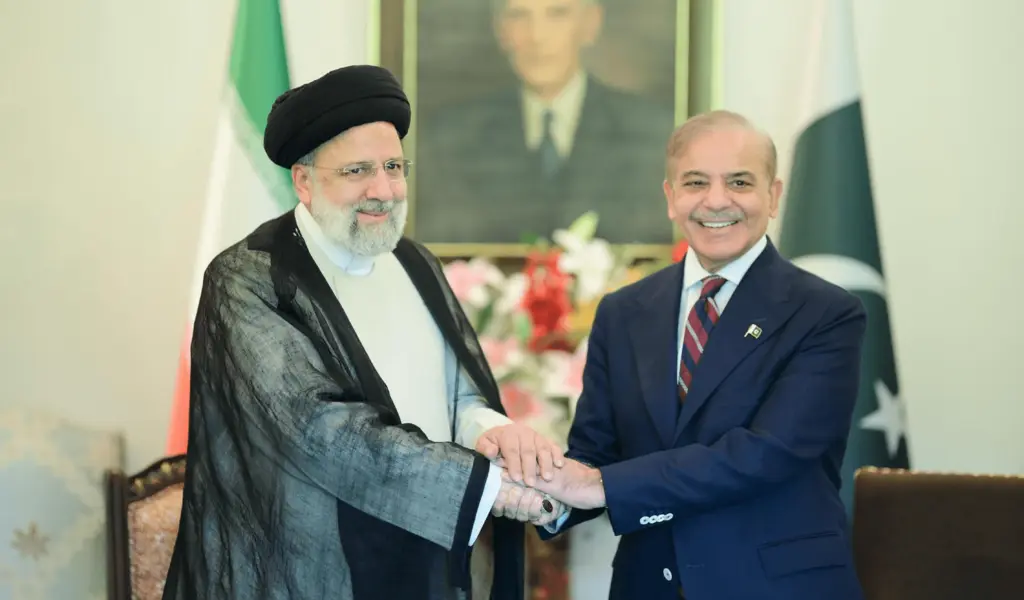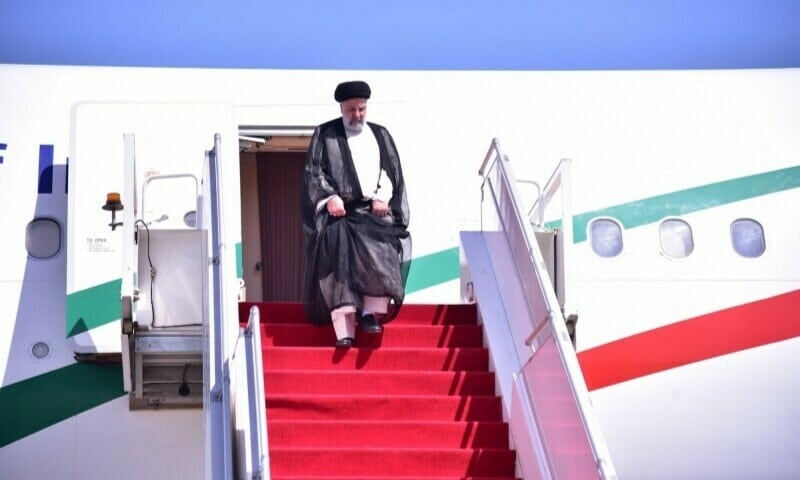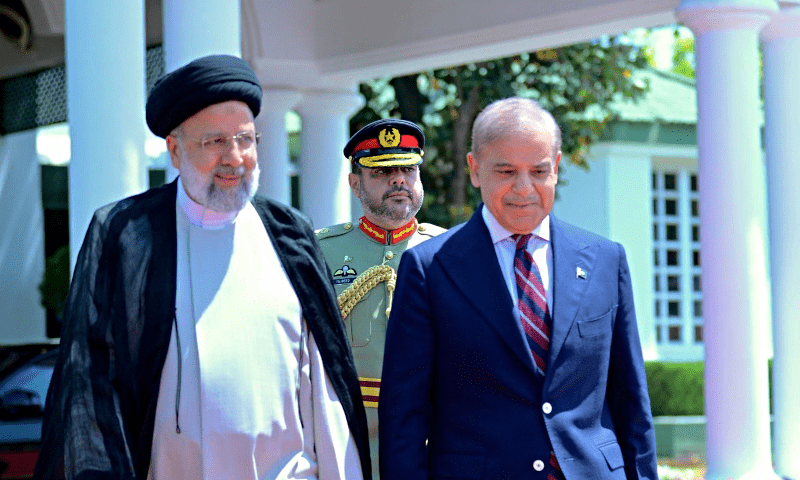(CTN News) – Iran and Pakistan have agreed to expand their trade volume to $10 billion, Iranian President Ebrahim Raisi said on Monday, adding that the current rate was “not acceptable”.
Raisi, now on a three-day visit to Pakistan, made the statements during a joint press conference with Prime Minister Shehbaz Sharif following their meeting in Islamabad. This is the first visit by a head of state since the February 8 national elections.
Boosting Economic Ties to $10 Billion
“We are committed to strengthening high-level relationships. […] The economic and trade volume between Iran and Pakistan is unacceptable. “As a first step, we have decided to increase the trade volume between our two countries to $10 billion,” he stated.
During his speech, the Iranian president thanked Prime Minister Shehbaz and the Pakistani government for receiving him. He also congratulated Pakistanis who had taken to the streets to demand freedom for Al Quds Al Sharif (Jerusalem).
He emphasized that there were “some common faiths and religions that are interconnected and cannot be disconnected.” The president also stated that trading “potentials and capabilities” would benefit both countries.
Raisi stated that during the meeting with PM Shehbaz, the two agreed to strengthen bilateral relations at the “political, economic, trade [and] cultural” levels.
Raisi noted that Iran and Pakistan share a “number of common positions and stands” on terrorism, saying: “Both countries are determined to fight against terrorism, organized crime, narcotics, and various forms and manifestations of insecurity that endanger our two countries and the region as a whole.”
“There may be some persons who oppose the expansion and promotion of excellent bilateral relations between Iran and Pakistan, but who cares? It’s not important.”
Raisi and PM Shehbaz visited the Mand-Pishin border market for its inauguration and acknowledged “some steps had been taken” but labeled them “not sufficient” and highlighted the need for more work.
“The Iranian people turned unlawful and unfair sanctions against their country into an opportunity. Today, Iran is a shining example of development and technology, and we express our willingness to share and transmit our skills and knowledge in this area with the wonderful people of Pakistan,” the president stated.
Pakistan-Iran relations
Meanwhile, Prime Minister Shehbaz advocated for improving Pakistan-Iran relations despite challenges: “We have to keep this relationship strong despite the challenges we both face.”
The premier stated that the two leaders discussed “religious, cultural, diplomatic, investment, and security matters” during their meeting.
The prime minister commended Raisi as an “ocean of political intelligence and wisdom” and added that Iran would advance further under his leadership.
PM Shehbaz emphasized the need to stabilize the two countries’ relationship and expressed hope that the shared borders could be transformed into places “where business, progress, and prosperity are seen everywhere.”
He emphasized the ability to “turn this friendship […] into a sea of development and prosperity”.
The prime minister thanked Raisi for Iran’s “strong stance” against Israel’s current war on Gaza, which has killed over 34,000 Palestinians and is in its seventh month. “The [United Nations] Security Council resolution is being shredded to bits and the entire world is silent,” he said.
PM Shehbaz also underlined the situation of civilians in Indian-occupied Kashmir, thanking the Iranian president for his assistance.
The premier congratulated Raisi for visiting his “second home” and expressed confidence that his visit would deepen connections between the two countries.
PM Shehbaz and Raisi met and pledged to work together to destroy terrorism, according to state-run Radio Pakistan. According to the article, the two presidents also discussed expanding bilateral commerce and communication links.
According to Radio Pakistan, PM Shehbaz stated that the entire nation welcomed the Iranian president’s visit, while Raisi thanked the premier for the warm welcome.
Raisi later visited with President Asif Ali Zardari at the President’s House.
“We expressed satisfaction with the trajectory of bilateral ties and agreed to further strengthen our dialogue and cooperation to reinforce existing ties,” President Zardari said in a statement posted by the Presidency’s X account.
He went on to say that Pakistan and Iran have a shared religion, history, and culture.
According to Radio Pakistan, Iran and Pakistan inked eight agreements and Memorandums of Understanding (MoUs) to cooperate in domains such as security, judicial aid in civil affairs, and veterinary and animal health.
The two countries signed a memorandum of understanding (MOU) to construct a special economic zone (SEZ) and another for film exchanges and cooperation between the information ministry and Iran’s Organisation for Cinema and Audiovisual Affairs.
According to Radio Pakistan, MoUs were signed between the Ministry of Overseas Pakistanis and Iran’s Labor Ministry, the Pakistan Standards and Quality Control Authority, and its Iranian counterpart.
Raisi and PM Shehbaz observed the pact signing ceremony, which included an MoU on legal cooperation.
According to Radio Pakistan, Foreign Minister Ishaq Dar met with Iran’s president in Islamabad to discuss bilateral relations and regional and global developments.
Raisi and Dar “emphasised the importance of increased efforts to further consolidate bilateral relations in diverse fields,” according to the report. The two leaders also “affirmed commitment to peace and constructive dialogue for resolving regional challenges.”
The Foreign Office (FO) already announced Raisi’s journey to Lahore and Karachi to meet with provincial leaders.
The two governments also agreed to prohibit terrorist organizations in their respective countries and develop a comprehensive strategy to combat the threat of terrorism by increasing mutual support and intelligence sharing.
Pakistan, Iran agree to ban terrorist organizations
Minister for Interior Mohsin Naqvi and his Iranian colleague Dr. Ahmad Vahidi met and agreed to sign a security accord after recognizing terrorism as a common threat.
The two also agreed to provide all available amenities to Pakistani pilgrims.
The two parties agreed that coordinated initiatives would help to guarantee that pilgrims received the finest possible amenities.
Both agreed to waive the fines imposed on their citizens imprisoned in the other’s country.
Naqvi stated that he wants the Pakistani captives in Iran to return home as soon as feasible.
The two countries also agreed to tighten up border management cooperation, including measures to combat smuggling and narcotics trafficking.
According to Naqvi, smuggling causes economic loss for both countries and preventing it through border control will assist in encouraging bilateral trade.
The two parties also agreed to activate the border markets.
Iran’s interior minister commended Pakistan’s “excellent job” on border fencing.








